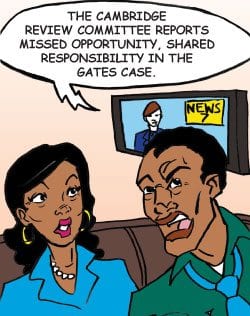
Excusing police misconduct
The arrest of professor Henry Louis Gates at his home in Cambridge last July created such a national furor that city officials had to respond. As is often done in such cases, they created a commission to study the matter. The Cambridge Review Committee published its Final Report on June 15.
The title of the report, “Missed Opportunities, Shared Responsibilities” suggests it is just a white wash. Surprisingly for such a review, the Committee seemed to ignore significant points of law.
A cherished principle of Anglo-American law is that a man’s home is his castle. The Founding Fathers of this nation enshrined that doctrine in the U.S. Constitution. The 4th Amendment states in part that “… people in their homes are to be secure against unreasonable searches and seizures…” Also, several states have established laws to define the extent of that right.
The arrest of Gates must be perceived from that perspective. He was at home. He had assumed sovereignty over one of the few places on earth where he could do so. He was tired because of a long flight from China, and he was irritated because he had to force his way into the house through a damaged door lock. Gates had no idea that someone had reported him as a possible burglar.
The sudden appearance of police Sgt. James Crowley was undoubtedly the cause of great anxiety to Gates. When a white policeman arrives at the door without being summoned, that is usually not a good sign for African American males. There is a long history of unpleasantries between white policemen and black men.
Gates’ discomfort was certainly not the result of ethnic paranoia. In his recently published book, “The Presumption of Guilt,” professor Charles Ogletree of the Harvard Law School provides numerous examples of police abuse of peer blacks, whose academic achievements provide no exemption. A few years earlier there was another case of a prominent black Harvard professor being arrested at his home by the Cambridge Police. His courtesy to the arresting officer did not protect him from being unceremoniously handcuffed and arrested on the basis of a completely false charge.
Nonetheless, the police indeed have the authority to bridge the moat of a man’s castle in pursuit of a burglar. However, that authority terminated immediately upon Crowley learning that Gates was no burglar and was the proper tenant of his Ware Street home. It was unlawful for Crowley to take any further action after the identification of Gates.
Also, the Cambridge Review Committee failed to emphasize the most troubling issue. Crowley believed he “had no choice” but to arrest Gates, although it was clear from the record that Gates had committed no crime. As a trained and experienced police officer, Crowley must have known that Gates was innocent of any criminal conduct. Therefore, he essentially had to entrap Gates by inducing him to continue his alleged tirade on the front porch where Crowley could charge him with disturbing the peace. Crowley must have known that the elements essential for sustaining the charge were missing, but he pursued the arrest regardless to show Gates who was boss.
The Cambridge Review Committee missed a great opportunity to set a higher standard for police conduct. Instead they suggest that African Americans must be ever more obsequious, and that white police officers shall not be reprimanded for violating their rights. Crowley refused to leave Gates’ home, pursuant to the Castle principle as soon as Gate’s identification was established; then he arrested him, out of pique, on a trumped up charge.
Gates is perhaps guilty of being a curmudgeon in his own home. That is a right that many Americans enjoy. To suggest that a display of ill-temper is equally inappropriate conduct as a false arrest is absurd. The relationship between the police and blacks will never improve, as the committee hopes, as long as blacks continue to be unfairly arrested and victimized by the justice system. That goal is indeed remote if the police are unable to restrain their predisposition to arrest accomplished and professional black men.






